
Odonata is an order of predatory flying insects that includes the dragonflies and damselflies. The two major groups are distinguished with dragonflies (Anisoptera) usually being bulkier with large compound eyes together and wings spread up or out at rest, while damselflies are usually more slender with eyes placed apart and wings folded together along body at rest. Adult odonates can land and perch, but rarely walk.

The petaltails of the family Petaluridae are among the most ancient of the extant true dragonflies, having fossil members from as early as the Jurassic, over 150 million years ago. A 2024 molecular phylogeny found that the petaltails comprise two clades, a Gondwanan clade and a Laurasian clade. Their divergence time was estimated at 160 million years ago.
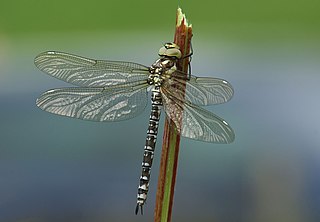
Aeshna, or the mosaic darners, is a genus of dragonflies from the family Aeshnidae. Species within this genus are generally known as "hawkers" or "darners".
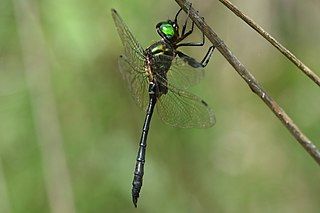
Corduliidae, also knowns as the emeralds, emerald dragonflies, or green-eyed skimmers, is a family of dragonflies. These dragonflies are usually black or dark brown with areas of metallic green or yellow, and most of them have large, emerald-green eyes. The larvae are black, hairy-looking, and usually semiaquatic. This family include species called "baskettails", "emeralds", "sundragons", "shadowdragons", and "boghaunters". They are not uncommon and are found nearly worldwide, but some individual species are quite rare. Hine's emerald dragonfly, for example, is an endangered species in the United States.
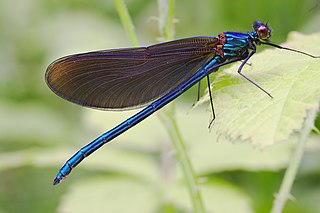
Calopterygidae is a family of damselflies, in the suborder Zygoptera. They are commonly known as the broad-winged damselflies, demoiselles, or jewelwings. These rather large damselflies have wingspans of 50–80 mm, are often metallic-coloured, and can be differentiated from other damselflies by the broader connection between the wings and the body, as opposed to the abrupt narrowing seen in other damselfly families. The family contains some 150 species.

The Cordulegastridae are a family of Odonata (dragonflies) from the suborder Anisoptera. They are commonly known as spiketails. Some vernacular names for the species of this family are biddie and flying adder. They have large, brown or black bodies with yellow markings, and narrow unpatterned wings. Their bright eyes touch at a single point, and they can be found along small, clear, woodland streams, flying slowly 30 to 70 cm above the water. When disturbed, however, they can fly very rapidly. They usually hunt high in forest vegetation, and prefer to capture prey resting on leaves or branches.

Neopetalia punctata is a dragonfly, the only member of the family Neopetaliidae.

The Platycnemididae are a family of damselflies. They are known commonly as white-legged damselflies. There are over 400 species native to the Old World. The family is divided into several subfamilies.

Calopteryx is a genus of large damselflies belonging to the family Calopterygidae. The colourful males often have coloured wings whereas the more muted females usually have clear wings although some develop male (androchrome) wing characteristics. In both sexes, there is no pterostigma.

Gynacantha is a genus of dragonflies in the family Aeshnidae. The females have two prominent spines under the last abdominal segment. This gives the genus name and the common name two-spined darners; they are also known as duskhawkers.
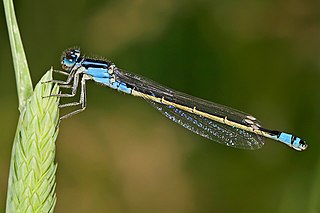
Ischnura is a genus of damselflies known as forktails in the family Coenagrionidae. Forktails are distributed worldwide, including various oceanic islands. The males have a forked projection at the tip of the abdomen which gives the group their common name.

Leucorrhinia is a genus of dragonfly in the family Libellulidae. They are commonly called whitefaces because of their distinctive pale frons.

The Lestoideidae are a family of damselflies occurring in South-east Asia, New Guinea and Australia. The family comprises two genera and nine species.
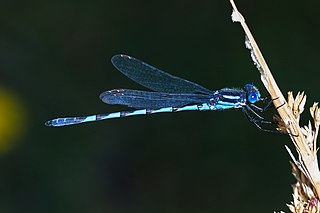
Austrolestes is a genus of medium to large-sized damselflies in the family Lestidae. Austrolestes damselflies sit with their wings folded completely back. Males are usually bright blue and black, the females duller. Members of this genus are found in Australia, New Zealand and South Pacific islands.

Cordulegastroidea is a superfamily of dragonflies that contains three families.

Austroargiolestes is a genus of damselflies in the family Argiolestidae. They are commonly known as Flatwings; unlike many other damselflies, at rest their wings are spread out flat.

The Perilestidae are a family of damselflies commonly known as shortwings and twigtails. It is a small family of around 19 species. All extant species are native to the Neotropical realm. In the past Nubiolestes of Africa was included in this family, but this is doubted. Palaeoperilestes electronicus is an extinct species described from mid-Cretaceous Burmese amber.

Hydrobasileus is a small genus of dragonflies in the family Libellulidae, found in Southeast Asia, Indonesia, New Guinea, the Solomon Islands and Australia.

Lestoidea is a genus of damselflies in the family Lestoideidae, commonly known as bluestreaks. Its species are endemic to north-east Queensland, Australia, where they inhabit rainforest streams.

Chlorogomphus xanthoptera is a species of dragonfly in the family Chlorogomphidae. It is known only from the Western Ghats of India, to the south of Palakkad Gap, including Anamalai Hills, Tirunelveli Hills, Munnar and south of Travancore.



















